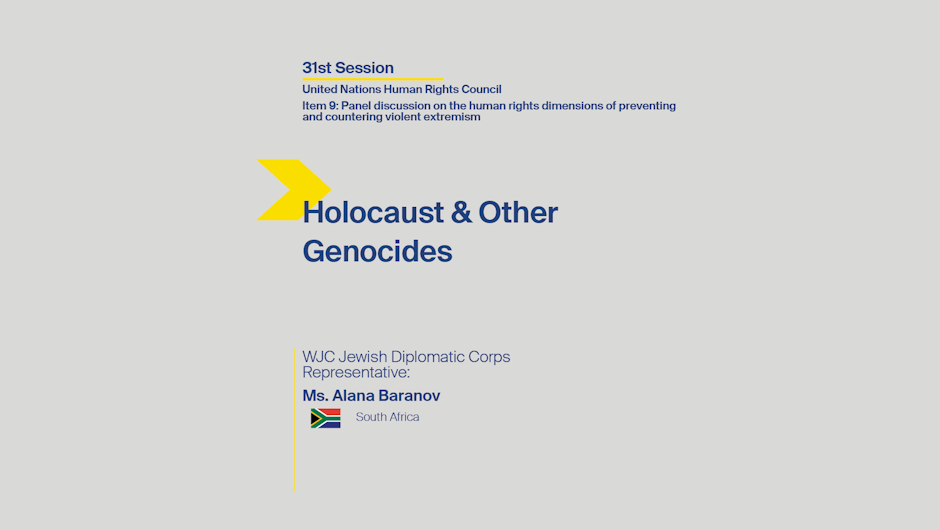
Holocaust & Other Genocides
Item 9:
Representative delivering the statement:
Ms. Alana Baranov ,
South Africa
Thank you Mr. President,
My name is Alana Baranov, I am South African and Jewish, and I represent the World Jewish Congress. March 21st marks International Human Rights Day around the world, but in my country, this day commemorates the sacrifice made in the struggle against racism and oppression.
Yet again, the world today faces an immense challenge. Mere decades after the Holocaust, the lesson of ‘Never Again’ goes unheeded as genocide, ethnic cleansing, and other atrocities in the name of hate, continue to unfold in various parts of the world. Unfortunately, anti-Semitism is as present as ever, with increasing verbal and physical attacks targeting Jews.
As a representative of the World Jewish Congress, I urge the Council to better address the scourge of anti-Semitism. Hate against Jews, is not just a Jewish problem, it is a universal one, and reflects flaws within our society. Therefore, we call on the Special Rapporteur on Racism as well as other mandate holders before this Council to address this pressing issue and ways to combat it.
History has taught us that what begins with words and sporadic incidents, can often lead to massacre and even genocide. As we saw during the Holocaust, and more recently in Rwanda, Srebrenica and Mount Sinjar, a society where people are dehumanized creates a space where unspeakable atrocities may occur. On the 15th anniversary of the adoption of the Durban Declaration and Programme of Action, the World Jewish Congress wishes to reiterate its continued commitment to eliminating all forms of racism.
We therefore appeal to this Council to promote and encourage diversity-training programs, employing the lessons of the Holocaust and other genocides. Further, we urge this Council and its concerned special procedures to monitor good and bad practice of states, and include in their recommendations practical tools for the promotion of tolerance. Such tools include educational workshops fostering tolerance as well as legislative mechanisms adequately addressing hate crimes and racial violence. Finally, in those places where hate crimes, hate speech and racial violence have taken place, we encourage restorative justice, which will prevent the future reoccurrence of these heinous crimes.